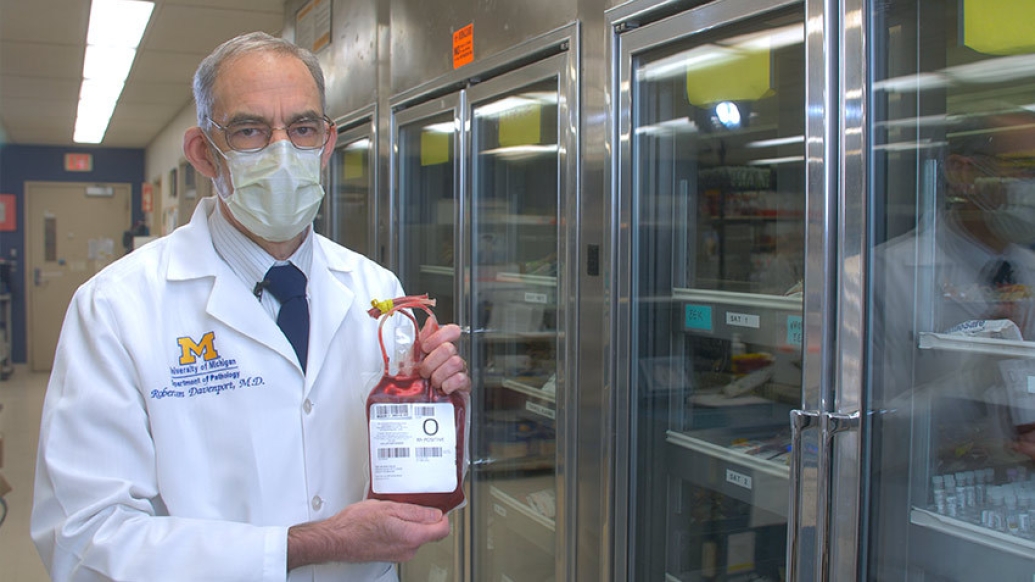Amid critical shortage, blood bank director pleads for eligible people to donate.
2:21 PM
Author |

A huge walk-in refrigerator at the heart of Michigan Medicine's main hospital should be full of bags of blood right now.
But instead, some of the shelves are bare, or nearly so.
Even blood plasma, which is almost never in short supply, has gotten scarcer.
Robertson Davenport, M.D., hasn't seen many weeks like this in nearly four decades as director of the Blood Bank at the University of Michigan's academic medical center.
The critical shortage, which has stretched supplies thin nationwide, threatens the ability to provide many types of patient care. The Red Cross has just declared the first-ever national blood crisis.
That's why Davenport urges every eligible person to step up and make an appointment to donate as soon as possible.
The surge in COVID-19 cases, on top of the usual holiday lull in donations and winter weather, have kept both potential donors and staff from making it to blood drives and donation centers.
"Right now, we are facing a critical shortage of blood, which can affect our ability to care for patients needing transplants, major surgeries, trauma care and cancer therapy," he said. "The pandemic has impacted all of our lives and is stretching hospitals to the limit. But the needs of other patients go on."
SEE ALSO: What it's really like to give blood
"As a nation, state and locally, we have been experiencing low blood supply levels to support patient care, now a crisis which can only be resolved with high levels of community support. Donating blood enables necessary treatment, avoids delays in care and saves lives. I urge all who can donate, to please do," said Tony Denton, senior vice president and chief operating officer for University of Michigan Health. "If you are unable to donate, please consider volunteering at a blood drive or helping to organize one in your community. Thank you for being ready to respond to this call to action".
The Michigan chapter of the Red Cross, which Michigan Medicine partners with for its blood supply, says not only blood, but volunteers at blood drives, are critically needed.
Beating rivals in blood donation
U-M fans, and fans of their rival schools Michigan State University, Pennsylvania State University and the University of Wisconsin, have an added reason to give in January and February.
Please, if you can give blood, do so. Our patients, and patients nationwide, are counting on you.Robertson Davenport, M.D.
The annual Big Heart Blood Battle starts January 18 and will tally up the donations given at blood drives associated with all four schools. After U-M trounced Ohio State in the fall Blood Battle (and on the football field as well), the winter challenge provides another chance to show Wolverine pride.
To find a drive where your donation will help U-M win the challenge, enter sponsor code "goblue" on the Red Cross donation site.
Why blood is needed
Davenport offers this quick overview of the major kinds of care that rely on a stable blood supply:
-
Transplants: "Liver, heart, and lung transplants are life saving operations that cannot be done without blood transfusions. When an organ becomes available, there is a short window of time, often hours, for the transplant to occur. Without enough blood in the blood bank, the transplant just cannot be done."
-
Cancer: "Unfortunately, new patients are diagnosed with cancer every day. Some cancer patients, particularly those with leukemia, need multiple transfusions to get through their treatment, which can last for weeks. For them the need goes on and on."
-
Traumatic injuries: "Severe trauma, such as a car accident, can happen at any time. Bleeding is the number one cause of death in trauma. Some trauma victims need literally gallons of blood."
He also reviews the kinds of blood products that his staff process thousands of times a year:
-
Whole blood: "There is need for all blood types, but the need for type O is greatest because it can be given to most patients no matter what their blood type. Type O is in particularly short supply right now." The Blood Bank team gets 32,000 units of whole red blood to patients each year, zipping individual units through pneumatic tubes in the walls of the hospital or hand-carrying coolers containing multiple units to the operating room or emergency department.
-
Platelets: "Platelets, which are needed to treat bleeding and cancer, are in short supply because they can only be stored for up to 5 days," Davenport explained. Giving platelets takes longer and requires special equipment, so donors are always needed. Michigan Medicine patients go through 15,000 units of platelets every year.
-
Plasma: "Unlike red cells and platelets, plasma can be frozen and stored for up to a year, so shortage of plasma is usually less critical," Davenport said. "However, as the pandemic drags on, even plasma has become a concern." More than 7,000 units of plasma are needed to treat bleeding and other conditions at Michigan Medicine every year.
If you've never given blood before, or it has been a while, this guide can help explain what it's like. If you aren't sure if you're eligible to donate, check the Red Cross website for common concerns and full eligibility guidelines.
SEE ALSO: When donating blood is 'the kindest thing you can do'
"Your blood could help save several lives within days after you donate," Davenport explained. "Please, if you can give blood, do so. Our patients, and patients nationwide, are counting on you."

Explore a variety of health care news & stories by visiting the Health Lab home page for more articles.

Department of Communication at Michigan Medicine
Want top health & research news weekly? Sign up for Health Lab’s newsletters today!





